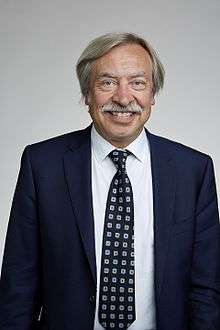Adrian Hayday
Adrian Clive Hayday (born 1956)[1] FMedSci FRS[2] is the Kay Glendinning professor and Chair in the Department of Immunobiology at King's College London and group leader at the Francis Crick Institute in the UK.[4][5]
Adrian Hayday | |
|---|---|
 Adrian Hayday at the Royal Society admissions day in London for new fellows in 2016 | |
| Born | Adrian Clive Hayday April 1956 (age 64)[1] |
| Alma mater |
|
| Awards | |
| Scientific career | |
| Fields |
|
| Institutions | |
| Thesis | Structure and activity of integrated polyoma viral DNA in transformed rat cells (1979) |
| Academic advisors |
|
| Website | |
Education
Hayday was educated at Queens' College, Cambridge where he was awarded a Bachelor of Arts degree in Natural Sciences (Biochemistry) in 1978.[3][2] He went on to complete his PhD in molecular virology of Polyomaviridae at Imperial College London in 1982.[6]
Career and research
Hayday began studying immunology as a postdoctoral researcher in 1982 at Massachusetts Institute of Technology (MIT) supervised by Susumu Tonegawa,[3][7] where he identified the molecular basis of oncogene activation in Burkitt's lymphoma. Thereafter, he first described the genes defining gamma-delta T cells, an evolutionarily conserved yet wholly unanticipated set of lymphocytes. At Yale University, King's College London School of Medicine and the Francis Crick Institute, Hayday established that gamma-delta T cells are distinct from other T cells, commonly monitoring body-surface integrity rather than specific infections. Their rapid responses to tissue dysregulation offer protection from carcinogenesis, underpinning Hayday's and others' ongoing initiatives to employ the cells for immunotherapy.[8]
Awards and honours
Hayday has received numerous awards, including the William Clyde DeVane Medal, Yale's highest honour for scholarship and teaching. He was elected to head the British Society for Immunology (2005–09), and has formally counselled King's Health Partners, the Pasteur Institute, Kyoto University, the Max Planck Institute, the Allen Institute, MedImmune, the National Institutes of Health, the Wellcome Trust, and Cancer Research UK whose science committee he chairs.[2] He was elected a Fellow of the Royal Society (FRS) in 2016.[2] He is an honorary member of the British Society for Immunology.[9]
References
- Anon (2016). "Adrian Clive HAYDAY". London: companieshouse.gov.uk. Archived from the original on 28 July 2016.
- Anon (2016). "Professor Adrian Hayday FRS". London: Royal Society. Archived from the original on 29 April 2016. One or more of the preceding sentences incorporates text from the royalsociety.org website where:
"All text published under the heading 'Biography' on Fellow profile pages is available under Creative Commons Attribution 4.0 International License." --"Royal Society Terms, conditions and policies". Archived from the original on 25 September 2015. Retrieved 9 March 2016.CS1 maint: BOT: original-url status unknown (link)
- Adrian Hayday's ORCID 0000-0002-9495-5793
- Anon (2016). "Adrian Hayday: Immunosurveillance Laboratory". London: crick.ac.uk. Archived from the original on 5 April 2015.
- Gibbons, Deena; Fleming, Paul; Virasami, Alex; Michel, Marie-Laure; Sebire, Neil J; Costeloe, Kate; Carr, Robert; Klein, Nigel; Hayday, Adrian (2014). "Interleukin-8 (CXCL8) production is a signatory T cell effector function of human newborn infants". Nature Medicine. 20 (10): 1206–1210. doi:10.1038/nm.3670. PMID 25242415.
- Hayday, Adrian Clive (1982). Structure and activity of integrated polyoma viral DNA in transformed rat cells (PhD thesis). Imperial College London. OCLC 930652868.
- Hayday, A (1985). "Structure, organization, and somatic rearrangement of T cell gamma genes". Cell. 40 (2): 259–269. doi:10.1016/0092-8674(85)90140-0. PMID 3917858.
- Kiyokawa, Hiroaki; Kineman, Rhonda D; Manova-Todorova, Katia O; Soares, Vera C; Hoffman, Eric S; Ono, Masao; Khanam, Dilruba; Hayday, Adrian C; Frohman, Lawrence A; Koff, Andrew (1996). "Enhanced Growth of Mice Lacking the Cyclin-Dependent Kinase Inhibitor Function of p27Kip1". Cell. 85 (5): 721–732. doi:10.1016/S0092-8674(00)81238-6. PMID 8646780.
- https://www.immunology.org/about-us/our-people/our-members/honorary-members